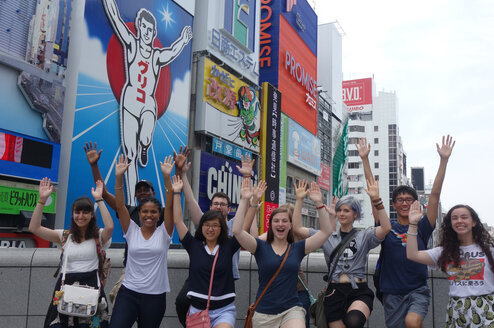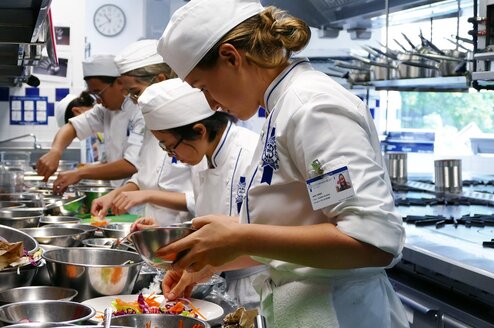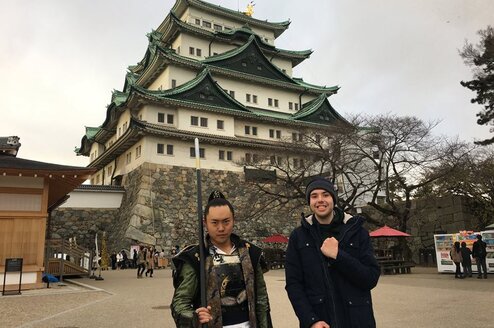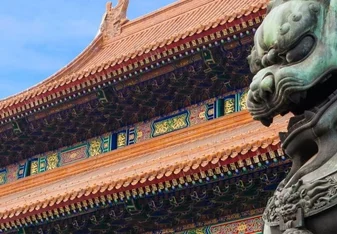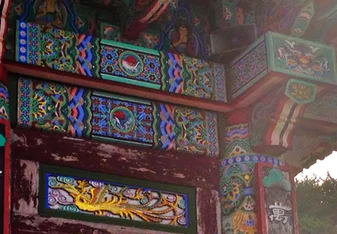Gap Year Programs in Taiwan
Gap Year Programs in Taiwan
About
Taiwan, rightfully called Ilha Formosa, or ‘The Beautiful Island,’ by Portuguese sailors, lies just under mainland China's shadow. From its capital of Taipei in the north to the tropical beauty of Kenting in the south, Taiwan is a warm, relaxing, and fascinating place to visit. Any visitor to Taiwan can expect to find a variety of things to do and sights to see. From trying the nose-bending stinky tofu or durian, a fruit banned in many countries, visiting the gorgeous temples, hiking on mountain tops, and eating fresh fruit from trucks on the side of the road, Taiwan offers a unique experience for anyone looking to take a gap year.
Program Types
There are many venues for taking a gap year. Whether you intend to fund your trip yourself, traveling from place to place and just sightseeing, or whether you want to find a job and travel from there, Taiwan has a program that can work for you. If you’re interested in teaching English, many schools will fund your travel and even provide lodging. Or perhaps you want to volunteer. There’s a program for that too. Or perhaps you want to see Taiwan without working. Backpacking is another viable option, but if that’s too hardcore for you, it’s easy to move from place to place without breaking the bank.
Teaching English
TESOL (Teaching English to Speakers of Other Languages) is an online resource dedicated to sending teachers worldwide. On the TESOL website, you can browse jobs, find books and other materials, and connect with other TESOL teachers. It’s a great start to finding a job, and their listings are extensive.
Of course, you will need a certificate for most English teaching jobs, and some may require a college degree. Make sure you check out the requirements for the school you’re applying for. There are many options for getting your certificate. Check your area for local classes, or go online to the International TEFL and TESOL Training site. They offer many options, with varying prices, for receiving your certification. The classes are delivered via email, and you have the option of receiving help from a tutor. The course can be completed within six months.
Depending on who you end up working for, your company may provide housing plus a stipend. Check with them to make sure. You may also need to apply for a working visa rather than a visitor’s, which is a lengthier process. Make sure to apply well in advance, as it can take several months to get approved.
HESS is another resource that sends people to Taiwan to teach. They’re an independent non-profit organization with schools partnering with local public schools to teach Taiwanese students various creative disciplines, such as speech writing or acting dramas. While they won’t offer you free housing, they pay a salary and offer an initial interest-free loan to help you get started. While not requiring a TESOL certificate coming in, they provide extensive training to equip you for your duties. Here is a career outline. If you’re looking for a more intense experience or a long-term commitment, HESS may be your best choice.
Teaching English is an enriching experience. Oftentimes, you may be the first foreigner many of the kids will have met in person, so expect plenty of stares and muttering. Asian students are renowned for being better-behaved and academically brighter than other nations, and Taiwanese students are no exception. While there may be the occasional rowdy or slow child, as a whole, expect your students to obey you without question and be willing to work hard on their English. A lot of the students, especially as you go up in grade level, will know quite a bit of English already and will probably have a lot of fun asking the teacher all kinds of embarrassing questions.
Volunteering/WWOOFING
Love gardens and self-sustaining eco-friendly living? Try WWOOFing it up in one of the many natural farms around Taiwan. The WWOOF website lists many hosts around the island that will exchange room and board for help around the farm. A note, though; you will have to pay your own way there, and any extras will cost you. Also, working on a farm is physically intensive, especially as Taiwan's heat and humidity can be oppressive. Not for the faint of heart – literally. That being said, this can be one of the best ways to really immerse yourself in the culture, particularly as you’ll be living with a Taiwanese family.
You do need to pay a fee to apply (around $26). This ensures you’re serious about the commitment. If you feel unsure about staying with an unknown family, don’t worry. The WWOOF organization is careful in its screening process for hosts. Before making the decision, you can preview hosts at preview hosts. This will give you a brief glimpse of what kind of work you can expect to do.
Adventure Traveling
Let’s say you have a lot of money and time and no desire to work while in Taiwan. You just want to travel the island and taste and see what it has to offer. Tripadvisor is a great site that gives you top destinations for all the major cities; you may have a hard time narrowing it down!
Any area of Taiwan is good for traveling. Keep in mind what you want, though. If you’re planning on taking a bunch of trips or visiting Taipei often for amazing shopping, you may want to settle on the Western side of the island. Taiwan is split down the middle by a long mountain range, traveling from one side to the other long and arduous. Taiwan recently built a High-Speed Rail system, which can get you from the northern to southern tip in less than two hours, but it only services the Western side, and not all cities have a stop on the line. If you’re on the Eastern side, you’ll experience more rain and weather, more tropical beauty, but going anywhere will be more tiring, since the only train is the slow train. Public transport is cheap and easy to use if you can get an English translation of the stations and bus stops. You may pay either in cash or through a pre-purchased card, which is carried by the local 7-11s.
For places to stay, search for homestays or B&Bs in the area you’re interested in. These are generally small and well cared for apartments or homes being rented out. Prices range from $10 - $100/night, depending on the area and how luxurious the apartment. Don’t look for too cheap, though, as you may find yourself sharing a bathroom or without a shower. Check out other options like hostels as well!
Planning Your Trip
Packing List:
- Light, sturdy clothing : There aren’t dryers for the most part, so any clothes that may stretch out are better left at home. The heat and humidity wear them out quickly, so expect to buy a few necessities on your travels. Don’t worry about bringing a heavy jacket; the winters are mild, and you can buy one if you need it for a good price at a night market.
- Medicine: Taiwan doesn’t have Ibuprofen, so make sure to bring plenty of pain killers.
- Favorite Beauty Brands: You can find plenty of Taiwanese or other Asian brands, and even a few American, but if you’re stuck on a certain kind, bring enough, as shipping it may be expensive. If you love Burt’s Bees, bring your own. They do have stores around the island, but the prices are sky-high.
- Kindle: English books are rare and expensive, so if you love reading, better to invest in an electronic format for convenience.
- Feminine Products: The Taiwanese selection is limited, and they don’t have tampons anywhere.
- Deodorant: The selection is tiny or non-existent, depending on the size of the store. Taiwanese people don’t seem to sweat or smell much.
Cost of Living in Taiwan
For finding the cost of living, Numbeo is the best website. They offer a full list of food, transportation, utilities, groceries, imports, rent, clothing, etc., and you can change the currency to whatever you’re used to.
Culture and Etiquette in Taiwan
Taiwan is an Asian country heavily influenced by Confucianism, which promotes filial piety and respect for elders. This has made Taiwan, like Japan or Korea, a very respectful and humble society on the whole. Don’t expect the people to be reserved and unfriendly, but do expect them to be more polite in public and definitely quieter.
If you’re a foreigner, remember that you may be influencing someone’s whole opinion about the Western world, so take care to present a good image. Public transportation is a time for silence, as many people sleep on buses and trains, and even out and about on the streets and in restaurants, it’s a good idea to keep your voice low. Be on your best behavior; laughing and pointing out things may be all in good fun, but it can be offensive.
One thing that may not be obvious is the taboo surrounding graves. Gravesites, while beautiful and interesting, are not tourist spots. Though you may really want to take a picture of it, don’t, as that is considered taboo and will seriously offend any native Taiwanese person around.
Health and Safety in Taiwan
Taiwan is a very safe country going by crime. While you shouldn’t take foolish risks or walk around by yourself in the dark, especially if you’re a woman, you shouldn’t need to worry too much about petty crime or theft. As for China, though they’ve had some bellicose rhetoric regarding the island in the past, most of the inhabitants don’t worry about it, and it doesn’t affect day-to-day living at all. For a comparison of crime rates between Taiwan and the US.
There’s not much to worry about health-wise either. If you have allergies, it may be harder for you to eat certain places, and you may want to carry a card with your allergies written in Chinese. While the tap water is not good to drink, it won’t kill you to brush your teeth with it, and Taiwan, as in much of the rest of Asia, has water machines with hot, warm, and cold filtered water available in business buildings and various other public places. It may freak you out a bit to eat at a stand on the side of the road, but the food is clean, and it's rare for anyone to get sick off of it. If you can’t stomach some of Taiwan’s more interesting cuisine, there are plenty of convenience stores with Western-style food, and McDonald’s is a popular and common sight as well.
If you do end up needing to go to the doctor, don’t worry. Taiwan has an incredible medical system, and it’s cheap to boot. Many people living in the Western world come to Taiwan simply for surgeries or other intensive medical care, as the prices are so much better and surgeons so skilled.
Contributed by Audra Edmonson
What People Are Saying
Related Gap Year Articles
Frequently Asked Questions
-
Is English widely spoken in Taiwan?
While it's possible to get by in Taiwan only speaking English, it's a good idea to brush up on some basic Mandarin phrases. English is more widely spoken in Taipei than in other parts of the country.
-
How long can a US citizen stay in Taiwan?
US citizens can stay in Taiwan up to 90 days without a visa. If you plan to stay longer you will need to apply for a visa.

